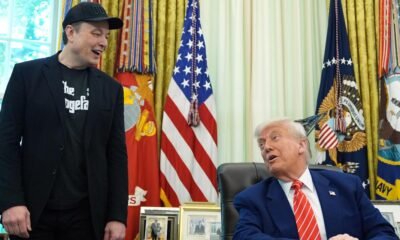Business
Economists Slam Dubious Calculations Behind ‘Bombshell’ Trump Tariffs Amid Stock Market Plunge

Markets experienced a significant downturn on Thursday following President Donald Trump’s announcement of broad tariffs that, according to experts, will disproportionately affect U.S. trading partners. Analysts noted this marked the steepest one-day drop in stocks since June 2020, prompting swift backlash from various business groups.
Trump introduced these tariffs during a White House event titled “Liberation Day,” where he criticized foreign countries for undermining the American economy. He described his approach as instituting “reciprocal tariffs,” suggesting that if other nations impose tariffs, the U.S. would respond similarly.
However, economists quickly challenged the president’s claims. They pointed out that the new tariffs do not align with the tariffs implemented by other countries. For instance, President Trump asserted that Vietnam imposes a 90% tariff on American goods, a claim that contradicts data indicating the actual rate is around 9.4%. Brad Setser, a senior fellow at the Council on Foreign Relations, highlighted the flawed calculations in the White House’s analysis.
The repercussions of the tariffs extend beyond Vietnam. Key allies will experience significant rate increases, with the European Union, Japan, and South Korea facing new tariffs of 20%, 24%, and 25%, respectively. These countries have already signaled intentions to retaliate if negotiations do not commence. Meanwhile, other nations with trade surpluses with the U.S. will incur a universal 10% tariff. This includes the U.K. and Australia, both of which maintain trade relationships with the U.S.
An alarming development is the potential impact on American consumers. A recent study estimates that the proposed tariffs could result in an average tax increase of $2,100 per household, with overall import levies rising from 2.5% to 18.8% over the coming years. This heavy financial burden raises concerns among small business owners, some of whom are already bracing for soaring costs on imported goods.
In response to escalating economic concerns, a bipartisan group of senators has proposed the “American Trade Review Act of 2025.” This legislation aims to enhance congressional oversight of tariff decisions, addressing fears related to inflation and economic stability. Senator Maria Cantwell emphasized the importance of a collaborative approach in the interconnected global economy.
States Newsroom reached out to the White House for clarity on the announced tariffs and their implications. In reply, White House spokesperson Kush Desai touted the administration’s commitment to economic growth, linking their trade policies to increased investment from major corporations.
As the situation evolves, the effects on both the U.S. economy and international relations remain to be seen. Experts believe that navigating these turbulent waters will require careful negotiation and collaboration with global partners.


















